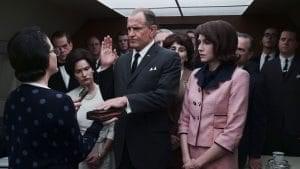
It must’ve been such an oddity for Rob Reiner to direct a movie about President Johnson. Not that it’d be impossible, but considering Reiner’s outspoken progressive beliefs versus the southern liberal games of LBJ, a clash of ideals would occur between biographer and subject. A conflict of respect for a leader and criticism of a politician. Reiner’s LBJ is a movie that exemplifies this struggle, both to a detriment and a fault. It’s clear that the director holds this President in some level of esteem, choosing where and what to explore very carefully. However he resists the paint by numbers biopic stylings, Reiner unfortunately can’t reconcile the positives and negatives of the man, both of which stick out like sore thumbs.
Reiner couldn’t, but Woody can. And does.

“…ranks as an excellent adaptation of Johnson.”
The jowls on Woody Harrelson’s face and his mannerisms in the performance of Johnson reminded me of something very close and homely. It was like watching an alternate timeline where my father had become an elected official, and it was more than the rimmed glasses, knowing smiles and determination, but in the anxiety of moving forward as a person, against all. LBJ rises above mediocrity with a sure footed Woody Harrelson at the helm of a challenged but willing man. His confidence makes acting look easy here, falling into the role with aged charm and empathy.
For me, the moment this was confirmed was a scene following the assassination of Kennedy. Johnson is informed that a delegation of southern officials are wanting to meet with him. He pulls up his suspenders, opens some double doors, and is greeted with applause and teary eyed adulation. Woody expresses shock and disgust all the while barely smiling and acknowledging the sentiment. Here, he is drawing a line in himself, preparing to separate from “tradition” and run with the ideals of civil rights. Up til this point, there was an uncertainty that Woody carried in his walk and swagger as Johnson, not wanting to make a stand either way on the movement of the time. But in confronting salivating racists, he experiences a reflection of what he could be seen as if action isn’t taken.

“Tender and light…”
LBJ comes close to being ho hum historical drama many times, even bordering on exploitation. The Dealey Plaza scene graphically shows the final bullet in complete display, where Johnson’s sole perspective would’ve sufficed. There must’ve been a need to break up the conversations and gaming with action and intensity, but if movies like Selma and The Butler didn’t resort to this, why should we endure it here? Reiner does switch things up soon after with black and white color editing of the state funeral and chooses to focus completely on Johnson when in the Dallas hospital, but often throughout we are exposed to bores and foot dragging in the direction, only to be saved with Harrelson’s command.
Tender and light, LBJ as a whole doesn’t quite live up to the singular performance of the man himself, but still works in bursts. When Kennedy meets Johnson to offer him the Vice President ticket, I nearly cried. There was a sense of respect and even brotherhood felt between Woody’s smile and Jeffrey Donovan’s charisma. This and other evocations between the actors fully makes up for most of LBJ’s technical difficulties. Maybe Rob Reiner was on autopilot, maybe he was severely confused in how to tell the story, but in letting his talent perform to their best, he has made a movie that could potentially garner an awards nomination for its most valuable player. Sincere in its duty but concerned in its thought, LBJ ranks as an excellent adaptation of Johnson. The best? That might be Tom Wilkinson in Selma.

LBJ (2017) Directed by Rob Reiner / Written by Joey Hartstone Starring Woody Harrelson, Jeffrey Donovan, Jennifer Jason Leigh
3 out of 5
